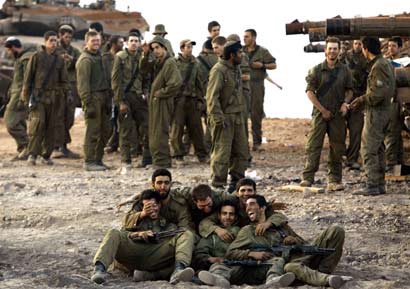Jerusalem - Israel halted its offensive against
Hezbollah guerrillas as a UN-imposed cease-fire went into effect Monday after a
month of warfare that killed more than 900 people, devastated much of south
Lebanon and forced hundreds of thousands of Israelis into bomb shelters.

Israeli
soldiers relax before a cease fire, near the northern Israeli town of
Avivim August 14, 2006. Guns fell silent across southern Lebanon on Monday
after a UN-brokered truce went into effect to end five weeks of fighting
between Israel and Hizbollah that killed more than 1,250 people and
wounded thousands. [Reuters] |
A half hour after the cease-fire took hold, Israeli warplanes, a regular
fixture in Lebanese skies during the monthlong war, were absent across huge
swaths of the country, including the Bekaa Valley, where airstrikes hit about an
hour before.
Thousands of cars packed with luggage and some with mattresses strapped to
the roof jammed the bombed-out Zahrani highway linking the southern cities of
Nabatiyeh, Tyre and Sidon, as Lebanese troops scrambled to repair roads in time
for the deluge of refugees returning home.
Hundreds of refugees camped out in a Beirut park packed up their belongings
to return to the city's southern suburbs.
There were no immediate reports of Hezbollah rockets being fired into Israel,
a day after it fired more than 250 rockets, the worst daily barrage since
fighting started July 12.
Some exhausted Israeli forces pulled out of southern Lebanon early Monday,
but were being replaced by fresh troops, and the army said there will be no
immediate withdrawal from positions seized in the last few days.
The army said in a statement the military was told not to initiate any action
after 8 am (1 am EST) Monday, but "the forces will do everything to prevent
being hit."
In the final hours before the truce, however, Israeli warplanes struck a
Hezbollah stronghold in eastern Lebanon and a Palestinian refugee camp in the
south, killing two people, and Israeli artillery pounded targets across the
border through the night.
The airstrikes continued until 15 minutes before the truce went into force,
destroying an antenna for Hezbollah's Al-Manar television southeast of Beirut.
The cease-fire was passed by the UN Security Council on Friday and approved
by the Israeli and Lebanese governments. Hezbollah leader Hassan Nasrallah also
signaled his acceptance.
But Isaac Herzog, a senior minister in the Israeli Cabinet, said it was
unlikely all fighting would be silenced immediately. "Experience teaches us that
after that a process begins of phased relaxation," in the fighting, he said.
Israeli Vice Prime Minister Shimon Peres also said Israel was uncertain the
truce would hold. "I believe that it has a chance. I can't say for certain," he
said moments before it took effect.
Implementation of the hard-won agreement already was in question Sunday night
when the Lebanese Cabinet indefinitely postponed a crucial meeting dealing with
plans to send 15,000 soldiers to police Hezbollah's stronghold in southern
Lebanon.
Lebanese media reported that the Cabinet, which approved the cease-fire plan
unanimously Saturday, was sharply divided over demands that Hezbollah surrender
its weapons in the south. That disagreement was believed to have led to the
cancellation of Sunday's meeting.
Lebanese leaders made no public comments.
The deployment of the Lebanese army along Israel's
border, with an equal number of UN peacekeepers, was a cornerstone of the
cease-fire resolution passed Friday by the UN Security Council. The forces are
supposed to keep Hezbollah fighters out of an 18-mile-wide zone between the
border and Lebanon's Litani River.